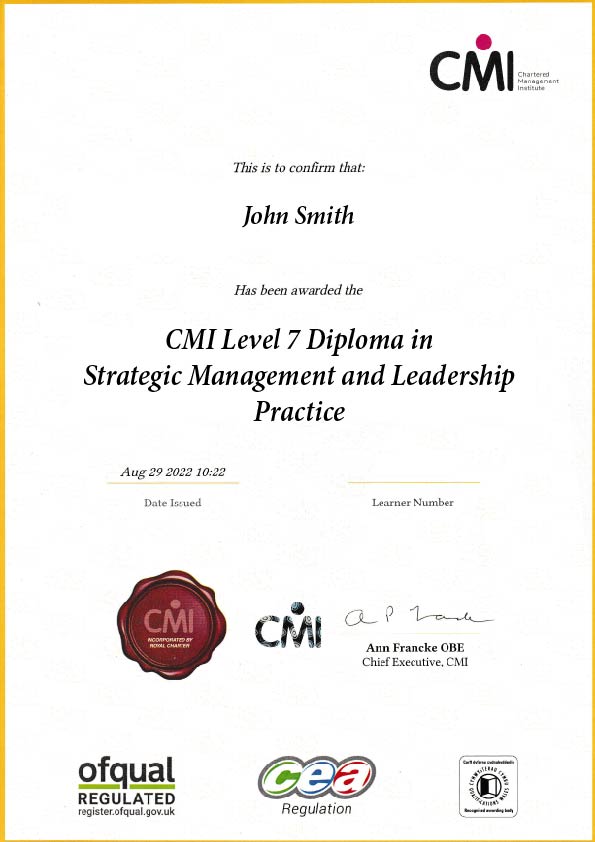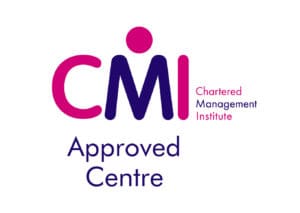CMI Level 7 Extended Diploma
The CMI Level 7 Extended Diploma in Strategic Management and Leadership Practice is for senior leaders who want to further build on their strategic management and leadership skills and focus on the requirements of implementing an organisation’s strategy.
This internationally recognised CMI qualification contains a range of units, which are reflective of the tasks and activities required by managers in roles such as Senior Managers, Regional Management and Specialist Managers.
If you are a leading Management professional in your organisation and are looking for a qualification that will allow you to leverage organisational strategy for your employees and company operations while validating your existing expertise, this qualification is for you!
Certification details
Fully-Accredited
ITonlinelearning (provider number C10436701) is a CMI Approved Centre (AP), which means that this certification has been rigorously assessed and approved to meet industry standards.
Your Certificate
Hard work pays off: you’ll receive a CMI Level 7 Extended Diploma in Strategic Management and Leadership Practice (qualification number: 603/7618/1) once you have completed your final unit in this qualification.
Certification: Level 7 Extended Diploma in Strategic Management and Leadership Practice
Vendor: Chartered Management Institute (CMI)
Course prerequisite: There are no formal prerequisites to study this qualification
Study time: 370 hours
Certification requirements: You will need to select and complete five or six units to a minimum total qualification time of 370 hours, with a minimum of 300 TQT hours from Group A, and 70 TQT hours from either Group A or Group B. The minimum guided learning hours is 106.

What’s included?
You are eligible for, subject to your package choice and support requirements:
- Consultation with a Career Consultant to corroborate your course choice
- Full selection of CMI Level 7 study units as offered by the CMI
- Depending on your experience level, you could be eligible for Foundation or full-fledged Chartered Manager Status
- Draft checking & official marking for assignments, as well as 1 free re-take
- Access to a full Support Team including a Tutor and Study Coach
- CMI Membership with exclusive benefits
- A professional, Management-oriented CV rewrite*
- A LinkedIn profile overhaul to maximise your new networking opportunities*

*Value-added service that can be added at an additional cost
Claim Your Post-Nominals
Want to command the highest esteem as a qualified Management Professional? Do you want to add the renowned “CMgr” post-nominals after your name to showcase your prestige?
You are eligible for full-fledged Chartered Manager Status if you complete a CMI Diploma or Extended Diploma (at Level 5 or higher) and have more than 3 years’ experience in a management role.
On your way to becoming a Chartered Manager? Why not take the first step with Foundation Chartered Manager Status, so that you can add the post-nominals “fCMgr” after your name?

Who are the CMI?
Since 1947, the Chartered Management Institute has empowered management and leadership professionals. The CMI upholds the highest standards of the profession and offers Chartered Manager Status through their Royal Charter, bringing together a global community of passionate & dedicated managers.
Established in the aftermath of the Second World War, their mission was to help rebuild the UK by raising the quality and standard of management. CMI developed the first diploma in management, and they are still dedicated to improving management practice today.

Choosing Us for Your CMI Training Means
You get access to the widest selection of Study Units available directly from the CMI to tailor a study programme that best suits you and your career.
Our Extended Diploma is built for those who would like to expand their scope, knowledge and skills. This includes 27 additional credits – taking you from 37 up to 64 credits in total.
Over and above your official assignment submission to the CMI that results in a pass or refer outcome, our in-house CMI Tutor and Study Coach checks your assignment draft. We review your assignment to give you feedback on the subject matter, provide you with advice, and ensure you are aware of any areas that need improvement – all to maximise your chances of getting a pass on the first try! Plus, you’re eligible for one free retake for each assignment.
You will have access to a CMI Study Coach and Mentor to keep you on track with your studies, provide you with study support, and help ensure you complete your studies successfully. Learners just like you regularly highlight the value of having a Study Coach and Mentor (in their learner surveys) in terms of helping them successfully achieve their qualifications in the most effective way.
Your personal, specialist Recruitment Advisor will provide you with a professional CV review, LinkedIn profile overhaul, interview support, and career coaching so that you can fully utilise the new networking opportunities you have access to!
You will gain exclusive access to the CMI so that you can benefit from continued professional development (CPD), career tools, webinars, articles, events, and networking with other CMI professionals!
With ITonlinelearning, you get 18 months’ unlimited access to your course – so you can access CMI’s Management Diagnostics Tool, Knowledge & Insights Hub, Events & Webinars, CPD Record, Mentoring, Management Direct, Career Development Centre, and Qwell Mental Health Support.
We are an Accredited Training Organisation (ATO) for the UK’s most esteemed learning providers
Why Choose CMI?
UK-Endorsed Accreditation
Hard work pays off: you’ll receive a certificate accredited by the prestigious, globally recognised Chartered Management Institute once you have completed this qualification: a highly regarded testament to your skills.
Improved Career Prospects
A whopping 80% of Managers said that gaining a CMI qualification is a key element of becoming a professional manager!
You Get Post-Nominals
Want to command the highest esteem as a qualified Management Professional? Do you want to add the renowned “CMgr” post-nominals after your name to showcase your prestige? With CMI, you can!
Helping You Help Your Team
About 79% of CMI qualification holders confirmed that their new skills have increased overall team performance – which is great if you’re looking to increase your salary on an individual- and team-basis.
Get a Master’s Degree/Doctorate Equivalent
When you complete a CMI Level 7 qualification, you earn the academic equivalent of a Master’s Degree or Doctorate in Strategic Management and Leadership Practice.
Assignment-Based Qualifications
Did you know that assignment-based assessment yields better results than examinations, likely because of the lack of feedback in exam-based qualifications? Well, CMI qualifications are assessed purely through assignment completion.

Source: Adzuna
Handpick Your Curriculum
ITonlinelearning offers all the Level 7 study units from the CMI – so you have the widest selection available to tailor a study programme that best suits you and your career!
To achieve the Level 7 Extended Diploma in Strategic Management and Leadership Practice, learners must choose a combination of modules below to a minimum or 640 TUT (Total Unit Time) hours and 64 credits, this must be made up of a minimum of 420 TUT hours and 42 credits from Group A only and 220 TUT hours and 22 credits from either Group A or Group B.
Group A
The aim of this unit is to equip leaders with an in-depth understanding of strategic leadership within an organisational context. Leaders will explore the complexities of the role and the theoretical perspectives, approaches, behaviours and skills which can enhance their professional practice. The unit focuses on the leader’s ability to respond creatively to complex organisational challenges and understand how to set and deliver sustainable strategic goals.
The aim of this unit is for leaders to develop an in-depth understanding of how to effectively lead and develop people. They will explore the influence and impact of leadership theories, culture, wellbeing, development and design, policy and strategy that can be used creatively within the leadership role. Ultimately, leaders will have the opportunity to propose a leadership and development strategy. The aim of which values people whilst optimising an organisation’s performance.
The aim of the unit is for leaders to understand collaborative and partnership arrangements. Leaders will critically assess the scope and value of these, as well as evaluating the impact of organisational and legal frameworks on how these arrangements are delivered. The unit culminates in the requirement for the leader to present a rationale for collaboration or partnerships to further an organisation’s success.
The aim of this unit is to enable leaders to know how to develop and influence an organisation’s strategic direction through the development of a meaningful strategy. To support this outcome, leaders will critique the factors which drive the development of organisational strategy and appraise approaches to successfully develop strategy. The unit culminates in leaders developing an organisational strategy to achieve a business goal. To complement this activity, leaders will propose an approach to implement and monitor the strategy developed to ensure its sustained success.
The aim of this unit is for leaders to understand the scope, context and complexity of leading strategic change. Leaders will understand how the application of analytical techniques, theories and models of change, and creative problem-solving can be used to equip them to lead strategic change with confidence. The unit culminates in giving leaders the opportunity to develop a proposal to lead a strategic change.
The aim of this unit is to provide leaders with an understanding of the scope, complexity and role of Finance within an organisational context. Leaders will know how to critically assess methods for analysing financial data and information required to make strategic decisions. Ultimately, the aim of this unit is to equip leaders to be more confident in their understanding of the Finance function.
The aim of this unit is to enable leaders to understand the relationship between organisational design and development and the achievement of strategic objectives. Leaders will understand the impact of current and emerging factors which influence the need for agile and adaptive organisations. On successful completion of this unit, leaders will be able to develop a proposal for sustainable organisational design and development to respond to current and emerging needs.
The aim of this unit is for leaders to develop an in-depth understanding of strategic risk management. Leaders will critically appraise strategic risk within an organisational context. They will assess strategies for risk management and the leadership skills to lead risk initiatives successfully. Ultimately, leaders will be given the opportunity to develop a framework to deliver a risk strategy in an organisational context.
The aims of this unit are for leaders to see strategic management of data and information as an opportunity rather than a challenge. Leaders will understand the strategic value and use of data and information and will critique strategies for its effective management. The unit culminates in the opportunity to develop a strategy to improve the use of data and information in a strategic organisational context.
The aim of this unit is to enable leaders to understand the context in which a marketing strategy is developed. Leaders will appraise theoretical frameworks and processes which inform strategic marketing. They will have the opportunity to reflect on the interrelationship between marketing and an organisation’s strategic aims along with the opportunities and impact of digital marketing. Ultimately, leaders will consider how to develop a marketing strategy, which will enable organisational success.
The aim of this unit is to enable leaders to explore the principles of entrepreneurial practice, understand the different contexts in which entrepreneurship can flourish and the characteristics of entrepreneurial leadership.
The aim of this unit is for leaders to undertake a strategic management project of their own choosing. To achieve this outcome leaders will develop a business case, propose research design to inform the project’s direction and recommend project management methods and tools to structure the delivery of the project. Leaders will report on project outcomes and reflect on the skills and behaviours which ultimately influence the success of the strategic management project.
The aim of this unit is to enable strategic leaders to develop an evidence-based understanding of applied research methods and the ways research can be conducted scientifically, ethically and legally in an organisational context. The unit will support strategic leaders to become producers of applied research, with the ability to generate new knowledge, based on the practical challenges of the workplace. The aim is to facilitate strategic decision making, and ultimately add value to the organisation.
The aim of this unit is to support leaders to understand approaches to personal and professional development. Leaders will critically reflect on the interrelationship between the skillset and mindset to develop as a strategic leader. Vitally leaders will reflect on their own personal, interpersonal and professional competencies and behaviours to lead strategically. The opportunity for leaders to reflect on their own performance will equip them to develop a meaningful personal and professional development plan.
The aim of this unit is to enable leaders to develop an in-depth understanding of equality, diversity and inclusion at a strategic level. Leaders will have the opportunity to critically assess structural inequality within an organisational and societal context. They will discuss approaches to comply with legal and good practice requirements and to appraise the influence of equality, diversity and inclusion on strategic objectives. The unit culminates in leaders being given the opportunity to develop strategic priorities for equality, diversity and inclusion.
The aim of the unit is for leaders to understand the impact of mental health and wellbeing on organisational performance. Leaders will critically assess the complexities of managing wellbeing and will appraise contemporary approaches for the creation of healthy work systems. The unit culminates in leaders being given the opportunity to propose a series of recommendations to create and sustain a positive culture of mental health and wellbeing within an organisational context.
Group B
The ability to procure, purchase and contract goods, services and capital items effectively is of paramount importance if an organisation is to succeed. For the professional manager and leader this knowledge and understanding is invaluable. It has the power to enhance decision making, strategic and operational planning and the effective delivery of outcomes within budgetary constraints.
Corporate Social Responsibility (CSR) and sustainability are topics keenly related to organisational accountability. Definitions and approaches taken to manage and lead CSR and sustainability vary according to the type and purpose of an organisation and its governance. Approaches typically include the development of aims and objectives, policy and strategy, with the intent to address the impact of an organisation’s activity on society, the environment and a commitment to ethical and responsible conduct.
Effective quality management is critical to meeting stakeholder needs and expectations, developing trust and reputation. It impacts on profitability, processes and procedures and the achievement of strategic objectives. Quality is not something that occurs by chance. It is reliant on strategic and operational planning and the commitment and drive by professional managers, leaders, teams and individuals to make it a success.
The principles laid down in organisational, corporate, functional and departmental policies have a direct bearing on the daily activities of an organisations workforce. Policy focuses on the activities which are of critical importance to an organisation. Policies can be used to set strategic direction. Policies also set expectations about the behaviours and values required by staff to work ethically and professionally within their roles and when representing the organisation.
The aim of the unit is to enable professional managers and leaders to take a fresh look at the role policy plays within an organisation, know how policy can be developed and ultimately, cascaded successfully to its intended audience.
Coaching is a powerful learning and development tool. Used effectively, it is able to optimise individual and team performance and the achievement of organisational goals. Coaching has rapidly become an essential leadership tool. It enables the professional manager and leader to support, motivate and empower individuals and teams in a conversational and insightful way. This contrasts with and complements the use of traditional directive leadership approaches.
A key part of this unit is for leaders to critically reflect on own their own ability to coach individuals and identify opportunities for improvement. In order to achieve this, learners will need to use coaching skills in their leadership practice.
The ability to make ethical decisions under pressure is a fundamental requirement of a professional manager and leader. Ethical decision making is not easy, especially when decisions are under the spotlight of stakeholder opinion, constrained by organisational, legal and regulatory requirements, where ambiguity exists, where risks are high or where the outcome of decisions will be unpopular.
The aim of this unit is to equip professional managers and leaders with the understanding of how to make ethical decisions in different organisational contexts.
The Key to Your Success
Your Expert Career Consultant has received extensive training in the solutions we offer, and they understand that making the wrong choice can have a negative impact on your career, and overall well-being. They’re here to:
- Get to know you, your goals, and your experience
- Help you through the best options for you
- Make sure you choose the right path: financially, psychologically, and professionally.
Career and Progression Prospects
Management is used in a plethora of sectors, but here are a few roles you’re qualified to explore with this certification:
Chief Executive Officer
Chief Operations Officer
Senior Director
Regional Director

Your Success is Assured
Expert Career Consultants
Our expert Career Consultants select qualifications that align perfectly with your aspirations by collaborating with you to identify your desired end-goal.
Certified Tutors
Our certified Tutors are there to assist you with course questions, exam queries, and revision, so you have all the support you need to ace your exams.
Study Coaches and Mentors
Your Study Coach and Mentor is dedicated to guiding and supporting you throughout your journey by providing motivation, encouragement, and monitoring progress.
Experienced Recruitment Advisors
Your Recruitment Advisor will provide you with the tools you need to succeed, like an industry-oriented CV, LinkedIn profile overhaul, and exclusive resources.
Projecting Your Salary
We want to help you achieve the best outcome in your studies so that you can flourish in your selected development pathway.
per year
Senior Director
per year
Chief Operations Officer
per year
Chief Executive Officer
Browse Our Digital Shelves for Related Courses
JOIN THOUSANDS OF SUCCESSFUL GRADUATES

CMI Level 7 Extended Diploma in Strategic Management and Leadership Practice
The CMI Level 7 Extended Diploma in Strategic Management and Leadership Practice is the highest qualification available at this level and would be best suited for Senior Leaders who want to build on their strategic management and leadership skills to effectively implement organisational strategy.

CMI Level 6 Diploma in Professional Management and Leadership Practice
This diploma teaches the knowledge, abilities, and attitudes necessary to lead and drive business operations. Diplomas provide a comprehensive and extensive programme of learning.

CMI Level 7 Diploma in Strategic Management and Leadership Practice
The CMI Level 7 Diploma in Strategic Management and Leadership Practice qualification is for senior leaders who want to further build on their strategic management and leadership skills and focus on the requirements of implementing an organisation’s strategy.
CMI Level 7 Diploma in Strategic Management & Leadership Practice
Frequently Asked Questions
You have questions, and we have all the answers
The Level 7 CMI qualification is intended for Senior Managers, Directors, and CEOs looking to grow their existing skills in management and leadership.
The Level 7 CMI qualification is equivalent to a Master’s Degree, Postgraduate Certificate/Diploma, and Doctorate in academic terms.
CMI qualifications are available at different levels of depth and duration. Awards are the shortest and most concise qualification type. Certificates provide a broader base of knowledge and skills and take longer to complete. Diplomas provide a comprehensive and extensive program of learning and typically take the longest of to complete.
CMI qualifications do not require individuals to take any official exams. However, a series of assignments must be completed and assessed by CMI-qualified Tutors before a qualification can be awarded. These assignments are research-based and have specific requirements, including font size and structure, as well as word limits that vary depending on the award, certificate, diploma, or extended diploma, and the level of the qualification.
The Chartered Manager status is the epitome of professional recognition in the management and leadership field. It signifies a commitment to exceptional management skills and continuing professional development, as well as a demonstrated ability to deliver measurable impact. As the only professional body with a Royal Charter, the CMI is uniquely qualified to award this prestigious designation. As a Chartered Manager, you would be able to indicate the prestige of your qualification with the post-nominals ‘CMgr’ following your name on professional documents and platforms including LinkedIn, your CV, or your email signature. Those just starting their careers in management may be interested in Foundation Chartered Manager status, which recognises existing skills and knowledge and provides a pathway to full Chartered Manager status.


